Flax oil, derived from pressing flax seeds, is possibly the best plant-based source of omega 3 fatty acids.
It’s a mildly-flavored and extremely healthy oil that can be mixed into recipes for healthier eating or taken by itself as a supplement.
Flax oil shares its benefits with all sources of omega 3 fatty acids; these benefits range from better cardiovascular health and lower levels of systemic inflammation to improvements in cognitive function and even mental health.
If you want to use flaxseed oil to capitalize on these health benefits, our research team has gone through the top flax oils on the market and ranked the top ten according to quality. After our reviews, we’ll go in-depth on the science behind the health benefits of flax oil.
Research
Rankings
1. NatureWise Flaxseed Oil
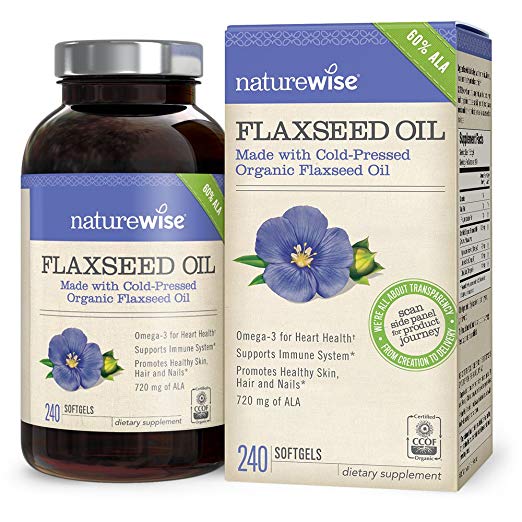
NatureWise Flaxseed Oil makes the top capsule based flax oil supplement on the market right now thanks to its high dosage (1200 mg per capsule) and the fact that it provides the exact breakdown of the amounts of omega 3, omega 6, and omega 9 fatty acids that are present in the oil.
If you are trying to adjust your omega fatty acid ratios, this is incredibly useful. The only drawback for some users is the gelatin in the capsule—people looking for a vegan source of omega 3 might want to opt for a product with a cellulose based capsule or a liquid flax oil.
2. Barlean’s Fresh Flax Oil
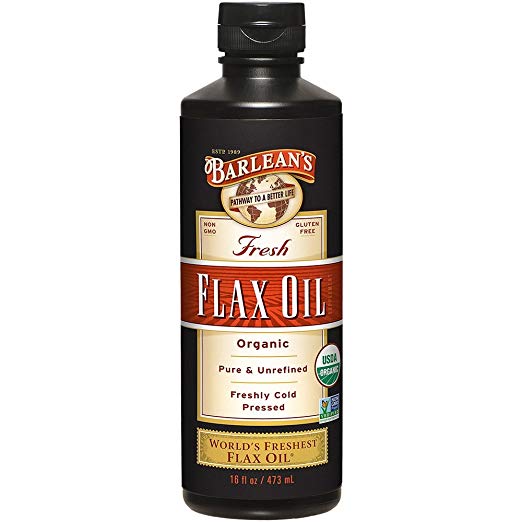
Barlean’s is one of the biggest names in natural seed oils thanks to its careful processing that preserves as much of the naturally-occurring nutrients in its oils as possible.
Their flax oil is organically grown and is cold-pressed soon after harvesting for maximal nutritional value and potency.
The opaque plastic bottle also ensures that the antioxidant power of the flax seed oil won’t be degraded by exposure to light. If you don’t need your flax oil measured out into capsules, Barlean’s is an excellent choice for a liquid flax oil.
3. NOW Flax Oil

NOW Flax Oil is certified organic and comes in a bottle that’s opaque to protect the oil from oxidation and spoilage.
It’s cold-pressed to preserve the nutrients in the raw flax seeds, making it a great choice if you want a liquid flax oil supplement.
4. Nature’s Way EfaGold Organic Flax Oil
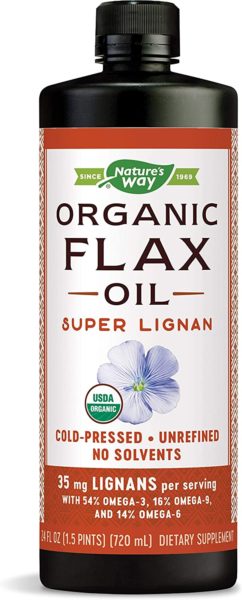
Nature’s Way EfaGold Organic Flax Oil delivers 24 ounces of liquid flax oil that’s refined to increase the content of lignan, one of the compounds in flax oil though to be responsible for some of its unique health benefits.
If you are a high-volume user of flax oil and want high concentrations of omega 3 and lignan, Nature’s Way is a good pick.
5. NatureMade Flaxseed Oil
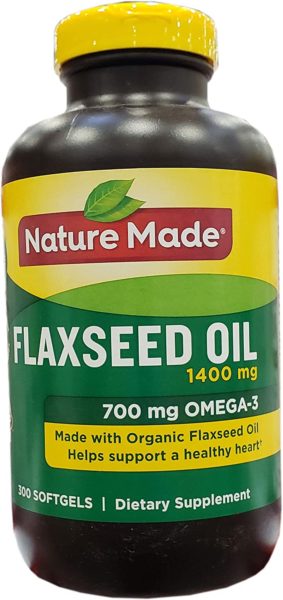
NatureMade Flaxseed Oil is fairly high dose, at 1400 mg per softgel. While it is not certified organic, it does deliver one of the highest dosages per capsule that you’ll find.
However, if you want to take truly large doses of flax oil, it’s still more advantageous to just use a liquid based flax oil supplement.
6. NOW Flax Oil Capsules
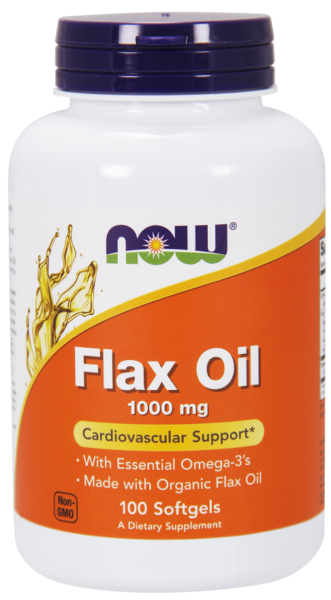
NOW Flax Oil makes a simple and easy to use flax oil supplement that is capsule-based and delivers 1000 mg of oil per capsule.
If you are a strict vegetarian or vegan you’ll have to look elsewhere, though, since the capsules contain gelatin. That aside, it’s a very solid pick if you want a high dosage capsule based form of flax oil.
7. Vitalité Now! Flaxseed Oil
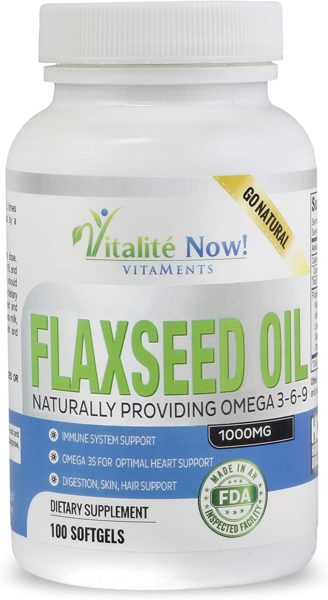
Vitalité Now Flaxseed Oil comes in gelatin capsules that deliver 1000 mg of flax oil each. The supplement design is pretty clean, and you even get info on the exact breakdown of the different fatty acids in each capsule and it’s organically certified, it’s still a pretty solid choice.
8. Sports Research Vegan Flaxseed Oil
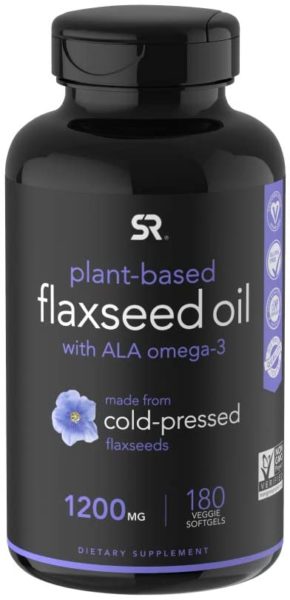
Sports Research Flaxseed Oil is a pretty standard capsule based flax oil supplement.
The veggie capsules have 1200 mg of cold-pressed organic flax oil each, and have the added benefit of 60% ALA to give you similar effects of omega 3s found in fish oil.
9. Puritan’s Pride Organic Flaxseed Oil
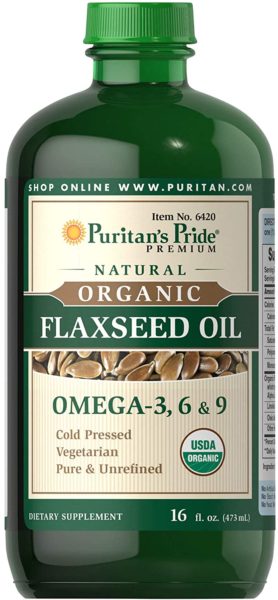
Puritan’s Pride Organic Flaxseed Oil comes in a large 16 ounce bottle, and is certified organic. The main issue with this flax oil is that the container isn’t opaque at all—the plastic is almost completely clear, which means that it won’t be able to block any incoming visible light.
The effect could be a degradation of the antioxidant capabilities of the flax seed oil over time, especially if you do not store it in a dark cupboard.
The problem is compounded by the fairly large volume of flax oil contained in the bottle: since it will take you longer to go through it, there will be more time for the oil to react with light and oxygen.
10. Zatural Flaxseed Oil
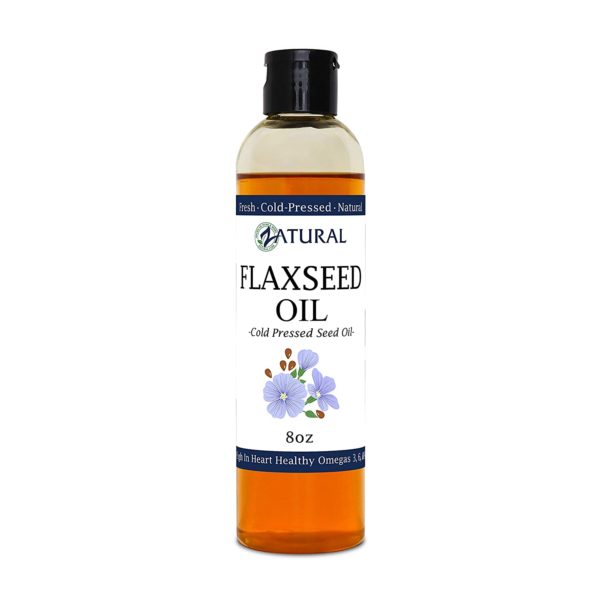
Zatural Flaxseed Oil uses cold-pressed flax seeds, but it falls short of the competition on two fronts. First off, the volume (eight ounces) is small, making it poorly suited for frequent users. Second, the bottle is completely transparent, meaning it can’t protect the antioxidants inside from ultraviolet light.
Category winners
Best flax oil overall: NatureWise Flaxseed Oil
NatureWise Flaxseed oil is our top overall pick thanks to its excellent EPA and DHA content and its convenient softgel form factor. Whether you’re using it for physical or mental health, the 1200 mg capsules in NatureWise are a very solid choice.
Best flax oil for constipation: Barlean’s Fresh Flax Oil
The healthy fats in Barlean’s Fresh Flax Oil can help ease the passage of waste through your intestinal system, making it a great pick for treating constipation. The liquid form makes measuring out the right dose simple and easy.
Best flax oil for hair: Barlean’s Fresh Flax Oil
Flax oil’s antioxidant properties aren’t just great for your body, they’re great for your hair, too. Barlean’s is the natural choice for fuller, healthier hair, thanks to the large 16 ounce bottle that’s opaque for UV protection.
Best flax oil for vegans: NOW Flax Oil
Want the benefits of omega 3s but don’t want to rely on animal-sourced fish oil? NOW Flax Oil is a great alternative thanks to its high DHA and EPA content and organic certification.
Best flax oil for mental health: NatureWise Flaxseed Oil
With some clinical research showing a benefit of using flax oil to treat depression, more people are flocking to flax oil supplements for mental health. NatureWise Flaxseed Oil is our choice on this front thanks to its simple formulation and potent omega 3 dose.
Best flax oil for heart health: NatureWise Flaxseed Oil
For improved cardiovascular health, we like NatureWise Flaxseed Oil. It’s got a solid balance of omega 3s and the capsule form makes it easy to incorporate into your daily supplementation routine.
Who should buy flax oil?
Flax oil is safe for most individuals and is great for promoting health and weight loss. Flax oil is a great addition to many dishes and is also useful in promoting a healthy heart due to its high concentration of omega-3 fatty acids.
Generally speaking, flax oil may safe for pregnant women and children, but you should consult your doctor before supplementing with it.
How we ranked
Since flax oil comes in two forms, pills and liquid, we had separate each category into its own ranking system. For liquid flax oil that comes in bottles, we ranked products like GNC and Barlean’s highly for using a dark bottle to protect against oxidation. Flax is sensitive to light, and packaging it in a clear bottle will allow it to go rancid a lot faster.
For pills, we looked for products like Natrol that provided 1000mg per serving, as this is the scientifically effective dose. Furthermore, we preferred products that used a cellulose-based capsule over gelatin-based one to accommodate more lifestyles. We chose not to include flax seeds or ground flaxseed because while healthy, making them into oil is extremely difficult at home and not worth the time, effort, or cost.
We also looked at the extraction process. When extracting the oil, excess heat can destroy valuable nutrients. This is why we ranked products that used cold-pressed extraction like Solar Earth Source a lot higher.
Because flax is a plant, it’s subject to a lot of pesticides and harmful chemicals. Products like Barlean’s made the top of our list because they were certified organic for extra purity.
Benefits
Flax seeds are rich in omega 3 fatty acids. Flax oil is an excellent source of omega 3 fatty acids, given that flax seeds are one of the richest plant-based sources of these healthy compounds.
The omega 3 fatty acids in flax oil have benefits for cardiovascular health, cognitive functioning, and mental health, to name just a few.
Among plant-derived foods, flax is a favorite source for people looking for vegan omega 3 oils. If you don’t eat fish, it’s hard to get many of the health benefits of omega 3s without something like flax oil in your diet.
Flax oil can help lower blood pressure. Flax oil, as a source of omega 3 fatty acids, is known to reduce a number of risk factors for cardiovascular disease, and first among these is blood pressure.
One study supporting this finding was published in 2007 in the European Journal of Clinical Nutrition by a team of scientists in Greece (1).
The study looked at a group of middle-aged men with risk factors for heart disease. They split the men into two groups, one of which was assigned a safflower oil supplement as a control, and the other of which was assigned an omega 3 supplement derived from flax.
The results showed that, compared to the control group, the men who took the flax oil supplement saw a decrease in their blood pressure.
The researchers suggested that a supplementation routine like this could be of significant benefit to men who are at high risk for heart disease.
Flax oil can be equally effective compared to fish oil when it comes to raising blood levels of EPA. There are two primary types of omega 3 fatty acids in fish oil that are thought to exert a protective effect on your body, EPA and DHA.
Flax oil does not provide either of these, but it does provide a different compound called ALA. This omega 3 fatty acid is a direct precursor to both EPA and DHA, but there are concerns about whether your body can efficiently convert ALA to EPA and to DHA.
A scientific study published in the American Journal of Clinical Nutrition sought to test the benefits of fish oil versus flax oil as methods to increase the body’s omega 3 fatty acid levels (2).
In the study, conducted at the University of Manitoba in Canada, the researcher split a group of firefighters into six different groups.
Two groups received flax oil, two groups received fish oil, and two groups received sunflower oil as a control. Within each oil assignments, one group was assigned a higher dose than the other.
The researchers followed the subjects for a total of 12 weeks, and the researchers monitored blood levels of omega 3 fatty acids via a blood test taken every two weeks.
The results showed that, while fish oil was most effective at raising DHA, flax oil resulted in similar increases in EPA. The authors suggested that flax oil could help garner many of the same benefits of fish oil thanks to its ability to increase blood levels of EPA.
The omega 3 fatty acids in flax oil could help improve symptoms of depression. An emerging body of scientific research is exploring the intersection between mental health, inflammation, and functional foods and supplements that mediate this process.
Chief among these is the role that omega 3 fatty acids play in mental disorders like depression. According to a scientific review published in 2016 that looked at a range of studies on omega 3 fatty acids and depression, there is a very strong case to be made for taking an omega 3 fatty acid source to prevent and treat depression (3).
First off, prospective studies have found that omega 3 fatty acid levels in the blood appear to be protective against depression.
Further, studies that examine omega 3 fatty acid levels in people with major depression find lower levels compared to healthy people.
Finally, several clinical trials have found a benefit to omega 3 supplements for treating depression as compared to placebo, as reported in a meta-analysis published in the Journal of Clinical Psychiatry by researchers in Taiwan (4).
Side effects
Flax seeds, the source of flax oil, are regularly consumed in high quantities in Mediterranean and Middle Eastern diets without any apparent ill effects.
Flax oil has also been tested in a range of clinical studies without any evidence of ill effects. One study, for example, tested a flax oil supplement in children with bipolar disorder, finding (in addition to a correlation between less severe symptoms and greater blood levels of omega 3 fatty acids) that the flax oil supplement was well-tolerated among the patients (5).
While the best fish oils are tested for purity anyways, there is less of a concern about accumulation of toxic heavy metals in flax oil.
Recommended dose
Compared to fish oil or algae derived vegan omega 3, the necessary dose of flax oil is higher. This is because your body is not perfectly efficient at converting the ALA in flax oil to the more biologically active EPA form.
Doses in clinical trials range from three grams per day all the way up to 12 grams per day. These higher doses appear to be used in shorter term trials focused on depression and bipolar disease, while longer trials for cardiovascular disease protection have more commonly used the three to six gram per day range.
At the high end of flax oil dosage, it’s clearly advantageous to use a liquid form flax supplement, because taking ten or twelve capsules per day can be burdensome.
For lower doses, capsules will work just fine and can help mask the taste and scent of flax, if you are not a fan.
FAQ
How much fiber is in a tablespoon of flax oil? In every tablespoon of ground flaxseed, you’ll find 2-3 grams of fiber, 10% of the daily recommended intake for magnesium, and plenty of other vitamins, minerals, and macronutrients. These values may seem rather small as compared to your daily recommended intake, but you have to consider that this is all within one tablespoon.
Can flax oil help to treat chronic health conditions long-term? Yes, flax oil can help treat and manage chronic health conditions long term. When consumed consistently over a period of one month, 10 grams of flaxseed per day led to a drop in blood glucose levels by 19.7% in diabetics.
There is also evidence that flaxseed can be used to prevent the growth of tumors, particularly those of colon, breast, skin, and lung cancers. When consumed consistently over 28 days, flaxseed has also been linked to a reduction in blood cholesterol levels by over 10% and a lower risk of cardiovascular disease. There is also evidence that flaxseed has antifungal and antioxidant qualities (6).
Does flax oil cause GI issues? Most of the side effects caused by flaxseed oil are related to the gastrointestinal system, including diarrhea, upset stomach, constipation, and flatulence. If you’re consuming flaxseeds whole, you should be aware that this may affect the process of digestion. Possible effects include a reduction in nutrient absorption and gastrointestinal upset when consumed in larger amounts.
There are some populations of people that should limit their use of flaxseed oil or avoid it altogether. For the purpose of safety, pregnant women, those with bleeding disorders, and those on certain medications should be careful when it comes to consuming flaxseeds and flaxseed oil.
Is it safe to take flaxseed oil every day? There are no real dangers of consuming flaxseed oil every day. In fact, if you’re looking to reap the most benefits from using flaxseed oil, daily consumption is ideal. If you begin to experience unfavorable side effects like diarrhea, constipation, or upset stomach, you should reduce your intake of flaxseed oil until the side effects subside. This will allow you to figure out what your body’s limit is when it comes to consuming flaxseed oil. The recommended intake for omega-3 fatty acids is 1000 milligrams per day or more. To achieve this recommendation, you only have to consume one serving per day, which is the equivalent of one tablespoon of flaxseed oil.
What are the differences between flax oil and flaxseed oil? Flax oil and flaxseed oil are the same products. Both products come from flaxseeds, which come from the flax plant. The flax plant is a fiber-like plant known for its role in creating fabrics and papers, but it’s also noted for the health benefits provided by its seeds.
What makes flax oil so healthy? Though high in nutritional value, flaxseed oil, and flaxseed, in general, have the ability to affect many of the body’s organs and organ systems positively. When included in the diet, flaxseed is able to help control blood sugar levels, cholesterol, brain development, hormones, skin health, and gastrointestinal health. Because of the wide range of effects you may experience, there is a greater chance that your overall wellbeing will improve (7).
The actual reason that flaxseed oil is so good for you is because of the nutrients found in the substance. Because flaxseed oil includes fiber, omega-3 fatty acids, and other highly-beneficial nutrients, it’s capable of providing plenty of positive health benefits within the body. With the supplementation of flaxseed oil, there is evidence that it leads to increased levels of alpha-lipoic acid, eicosapentaenoic acid, and docosapentaenoic acid within the body (8).
What are the best substitutes for flax oil? Depending on the recipe you’re making, you could use olive oil, fish oil, any type of nut oil, and even peanut butter to replace flaxseed oil. Before you select the substitute, you should consider the effects it may have on the taste, nutritional value, and consistency of your recipe.
What is the medicinal use of flax oil? There is a wide range of medicinal uses for flax oil that have been proven by scientific studies and research. Not only does flaxseed oil help to treat the symptoms of some minor health ailments, but it can also be used to assist with the treatment of major health disorders. Flaxseed oil can help to treat constipation, diarrhea, diabetes, cardiovascular disease, obesity, cancer tumors, inflammation, dry skin, menopause, and irritable bowel syndrome (IBS).
Is there pure flax oil on the market? Flax oil is sold in both a manufactured and organic form. At health and wellness stores like GNC and The Vitamin Shoppe, you can purchase organic flaxseed oil without worrying about whether some nutrients were lost. Unless labeled as “organic,” you should not expect that your flaxseed oil is pure.
If you’re looking to consume pure flaxseed oil, you can also do so with capsules. There are many options on the market for flaxseed oil capsules, usually with about 1000 milligrams of flaxseed oil per capsule. This is one of the most direct ways of consuming flaxseed oil.
Where can you buy flax? If you’re looking to buy flaxseeds and not flaxseed oil, it’ll probably be easier to find it in stores.
Given the fact that flaxseeds are a relatively popular ingredient in many recipes because of its health benefits, they can be found in grocery stores and some retail stores. Due to this popularity, there’s also more of a chance that’ll you have a greater selection of products in stores (rather than just one option).
Flaxseed oil, on the other hand, is most commonly sold in health and wellness stores like GNC and The Vitamin Shoppe. Any of these products are very easily found on the Internet, which is by far the easiest way to obtain them. Like almost any product, you can buy flaxseed products from Amazon and Walmart.
What does flax oil taste like? The taste associated with flax oil isn’t usually strong. For the most part, any flaxseed oil that you consume may taste somewhat “nutty.” Since the taste of flaxseed oil is somewhat mild, it’s easier to find a substitution for the oil or use the oil to substitute for substances like butter and other types of oil.
How do you use flax oil? There are many methods of using flaxseed. In seed form, you can add them to recipes or sprinkle them on top of your food to provide your daily intake easily. You can also cook or bake the flaxseed as well as grind it into a powder form and add them to foods.
If you’re interested in using actual flax oil within your diet, you can use it as a type of dressing or condiment with meals, add it to soups or salads, or combine it with your favorite protein drink. There are almost unlimited opportunities for how you use flaxseeds or oil when cooking.
The final way to use flaxseed oil is through the ingestion of flaxseed oil capsules. These capsules are available at health food stores (as well as some retail stores) and usually provide over 1000 milligrams of flaxseed oil per serving.
Can you eat flaxseeds? Though flaxseeds are most commonly consumed in the form of oil, you can eat flaxseed both whole and ground. Generally speaking, the only time you should be eating raw flaxseed is as an additional ingredient in meals and foods. Long-term, there are potential dangers of eating large amounts of flaxseed, most having to do with the functioning of the gastrointestinal system.
You can also grind flaxseeds to create a powdery texture and add the powder to some of your favorite snacks (like yogurt). If you’re interested, you can cook or bake the flax seeds as well. There’s a chance that you’re already consuming flaxseeds or flaxseed oil and don’t even know it. In recent years, it’s become popular to add flaxseed products into items like bread, protein shakes, granola bars, etc.
Does flax oil help with weight loss? Flax oil won’t directly cause weight loss, but the nutritional makeup of the food can help promote weight loss in the long-term. The major reason that flaxseed can benefit weight loss is because of the amount of fiber and protein in the seeds. Both fiber and protein are effective in reducing appetite and allowing you to feel “full,” which will eventually lead you to consume less food, which can result in weight loss. Fiber also helps you to maintain a properly functioning digestive system.
Can you use flax oil in your hair? Rather than consuming the flaxseed oil, you can use the oil on your hair to improve the condition of your hair. When added to the hair, the flaxseed oil can promote a smoother texture and overall more visually appealing appearance. There is also some evidence that flaxseed oil may boost hair growth in those that have experienced hair loss.
Can flax oil oil be applied topically to your skin? Just as flax oil is used on the hair, it can also be used directly on the skin. When used on the skin, it can provide a moisturized feeling and reduce imperfections in the skin. Because it’s a natural product, there is little risk of side effects unless you’re allergic.
Related articles
Recap
Flax oil is a good source of plant-based omega 3 fatty acids. While it does not have the concentrated power of the omega 3 fatty acids in fish oil, it can still deliver cardiovascular, cognitive, and mental health benefits.
These can includes lower blood pressure, better cognitive functioning, and decreased symptoms of depression. Flax oil is also quite safe and well-tolerated, even at very high daily dosages.
Scientific studies have focused on dosages ranging from three grams per day all the way up to 12 grams per day, though the high end of this range is more typical in studies on mental health.
Three to six grams per day seems to be a good middle of the road dosage that can help you achieve better physical, mental, and emotional health.
For BodyNutrition’s #1 flax oil recommendation, click here.